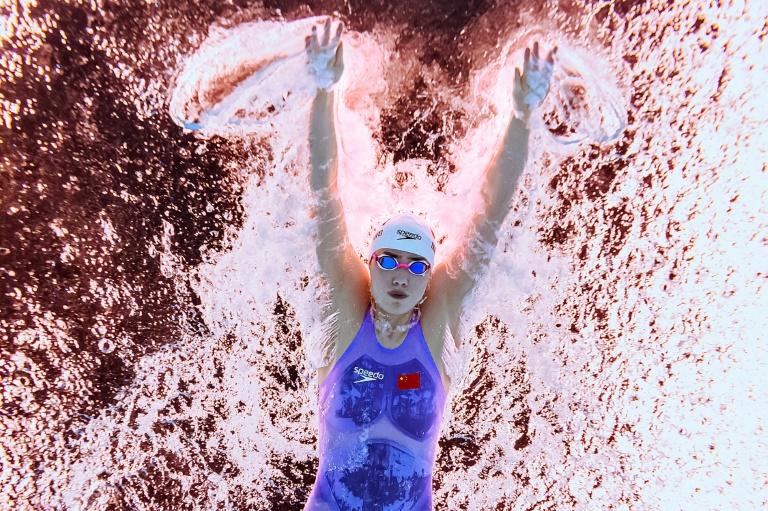China’s swimmers head to the Paris Olympics under fierce scrutiny with 11 of the squad among a group who tested positive for a banned substance in the lead-up to the Tokyo Games.
Swimming is always one of the most eagerly anticipated events and along with the United States and Australia, China are expected to be among the medals when the Games begin on July 26.
Any success will face immediate questions, however, after revelations in April that 23 Chinese swimmers tested positive for trimetazidine (TMZ) at a domestic competition in late 2020 and early 2021.
They were allowed to compete in Tokyo a few months later after the World Anti-Doping Agency (WADA) accepted the Chinese authorities’ conclusion that the adverse findings were caused by contaminated food at a team hotel.
Eleven of the 23, including reigning Olympic and world champions, will be in the French capital, making up a third of China’s swim team.
The way the news of the failed tests was revealed — via the media and only years later — sparked accusations from the United States’ anti-doping body of “a potential cover-up”, something WADA and China have strenuously denied.
TMZ is a prescription heart medication but it is banned in athletes because it can enhance performance. The swimmers were found to have “consistently very low levels” of the drug, WADA said.
TMZ was the medication at the centre of the Beijing 2022 Winter Olympics doping scandal involving teenage Russian figure skater Kamila Valieva. She was banned for four years in January.
– ‘No winners here’ –
The New York Times, which together with German broadcaster ARD first reported the 23 failed tests, then said in June that three of those had also tested positive for another banned substance years earlier.
Chinese authorities argued the three had ingested the substance inadvertently through contaminated meat, and no disciplinary action was taken.
WADA said the trio were found to have levels of clenbuterol which were between “six and 50 times lower” than the minimum reporting level currently used by the agency.
Following the initial furore in April, WADA — which has come under fierce criticism in some quarters — ordered an independent review into its handling of the case of the 23.
“This is a huge mess and one largely of WADA’s own making,” anti-doping expert April Henning, from Edinburgh’s Heriot-Watt University, told AFP.
The scandal affects not just WADA but other athletes and governing bodies, as well as “the Chinese swimmers in this case who will now forever be labelled as dopers even if there truly was a contamination issue”, said Henning.
“There are no winners here.”
China has consistently denied there was any intention to cheat and railed against “fake news”.
Some Chinese media have presented the story as an American-led plot to discredit the country and its team.
– Medal contenders –
Zhang Yufei was one of the swimmers alleged by The New York Times and ARD to have been among the 23.
The 26-year-old, one of China’s biggest stars, won two golds in Tokyo and the so-called “butterfly queen” will again be in contention for medals in Paris.
She told AFP in May that her aim for the Olympics was to “surpass my past self”.
In written answers to questions posed before the positive tests came to light, Zhang said winning the 200m butterfly in Tokyo and the medal ceremony afterwards were “the most precious moments in my life”.
AFP tried to contact Zhang and the Chinese Swimming Association several times since the controversy erupted but neither replied to the questions put to them.
China’s 31-member swim squad also boasts several others who will seriously challenge for medals in Paris but have questions hanging over them.
Also alleged to have been among the 23 and set to compete in Paris are Wang Shun, the 200m medley gold medallist in Tokyo.
There is also Qin Haiyang, a breaststroke multiple world champion and the 200m record-holder.
China’s best-known swimmer, the three-time Olympic gold medallist Sun Yang, will not be in Paris — he is only just back from suspension for an anti-doping violation of his own, the second of his career.
reb/pst


